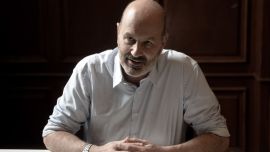New Central Bank President Miguel Ángel Pesce has pledged to further cut interest rates to boost a free-falling economy while fighting inflation through a “social pact” that would encourage companies to raise production rather than prices.
In an interview with Bloomberg, Pesce said he expects the key rate floor to fall again in January after two cuts last month. At 55 percent, the benchmark rate is still the world’s highest, although considerably lower than the September peak of 85 percent recorded under his predecessor.
“We will definitely continue with the descending rate path,” Pesce said in his first interview with foreign press in the new position. “High rates didn’t have the effect of slowing inflation and they were creating a sharp recessionary effect.”
Pesce, 57, was appointed last month by President Alberto Fernández as the 62nd president of Argentina’s Central Bank – a high-turnover position for an institution founded almost 85 years ago. The bank isn’t legally independent from the Executive branch and the president is effectively allowed to appoint or fire its head at will.
The bank has seen its credibility dwindle along with its foreign reserves, adding to the government’s challenge to renegotiate its debt and avoid a hard default. The region’s second-largest economy is poised to contract for a third straight year, its unemployment rate remains in the double digits and annual inflation hovers above 50 percent.
Argentina’s inflation problem, Pesce said, is based on “inertia,” which means prices and salaries have increases based on past inflation. In order to break that cycle, the Central Bank chief will rely on an unconventional recipe: an agreement between government, businesses and labour unions to rein in prices, which Fernandez has defined as a “social pact.”
The government announced Tuesday that it was extending a programme that caps prices on staple food items and has given fixed-rate increases to pensioners and government workers. Pesce expects those actions to immediately bring down annual inflation hovering above 50 percent.
The new approach amounts to a reversal of the economic policies adopted by the previous government. Under former president Mauricio Macri, the Central Bank sought to lift currency and capital controls, implement inflation targets and control prices via monetary policy instruments, although it eventually resorted to controls at the end of his term.
No forecasts
Pesce declined to provide forecasts for inflation or any other key economic variable, including growth, fiscal targets and net foreign reserves. When asked to confirm a prior forecast of achieving single-digit inflation by end-2021, he described it as an “optimistic hope.”
“I’m not going to make inflation forecasts, but it will be lower than in 2019,” Pesce said. He plans to build the Central Bank’s credibility “with results” and says that “forecasts have deteriorated the Central Bank’s credibility recently.”
He also didn’t commit to keeping positive real interest rates – or rates minus inflation – to encourage savings in pesos, although he expressed optimism that they’d be possible.
Pesce worked at the institution for over a decade until 2015, under four Central Bank presidents during the governments of the late Néstor Kirchner and Cristina Fernández de Kirchner. Before taking on the new job, he was president of Tierra del Fuego Province’s bank, Banco de Tierra del Fuego, in Argentina’s south.
Some investors worry Fernández could intervene in monetary policy like Fernández de Kirchner, who is now vice-president, did when she governed the nation from 2007 to 2015. Pesce said, however, that he has only “sporadic” contact with Fernández.
“I don’t have daily contact with the president,” he said. “The president puts his faith in the central bank’s leader and the board of directors and once that faith has been placed, you have to do your job.”
Highlights
Below are other highlights of the interview:
FX Policy
- Pesce says Argentina’s real foreign exchange rate is at an “acceptable” level and the bank will monitor it to make sure it doesn’t strengthen compared to inflation.
- The Central Bank will give a priority to export-focused sectors, particularly oil, in its FX regulation, as long as the current account surplus permits.
- This may include allowing companies to send dividends abroad despite capital controls.
IMF deal
- Negotiations with the International Monetary Fund will be led by Economy Minister Martin Guzmán, and Pesce says the Central Bank will collaborate as needed.
Debt and reserves
- The Central Bank will continue with daily auctions of Leliq notes and will extend the seven-day Leliq term to promote a secondary market.
- The Central Bank aims to use its balance sheet surplus to service debt.
- It sees no need to tap or increase its existing China swap at this point to access hard currency.
- Treasury notes transferred to Central Bank don’t make up reserves and are only on the balance sheet; the central bank hopes to eventually reach debt sustainability so these types of instruments aren’t necessary.
- The Central Bank isn’t concerned with the debate on whether to value these notes at face or market value because Pesce expects to hold the notes through maturity.
Monetary base, economists survey
- Changes to the monetary base shouldn’t be inflationary given that the base is near historic lows, Pesce said, adding that the bank will mop up pesos in February if necessary.
- For now, the Central Bank will continue to publish its economist survey but Pesce warned that those who participate in the survey “have to improve the quality of their forecasts because in 2018 and 2019 they were wrong.”
related news
by Jorgelina do Rosario, Patrick Gillespie & Carolina Millan, Bloomberg























Comments